#ERP Software Market
Explore tagged Tumblr posts
Text
The ERP Software Market is projected to grow at a compound annual growth rate (CAGR) of 11.98% from its 2023 valuation of US$ 51.21 billion to US$ 113.08 billion by 2030.
0 notes
Text
ERP Software Market Size and Share, Revenue, Upcoming Trends, Growth Drivers, Challenges, Opportunities and Forecast Till 2033: SPER Market Research
Enterprise Resource Planning (ERP) software is a collection of integrated programmes that help manage fundamental business activities such as finance, human resources, supply chain, manufacturing, customer relationship management (CRM), and more. It offers a unified platform for data storage, analysis, and collaboration, allowing companies to streamline operations and make data-driven decisions. ERP software removes the need for many systems and manual processes, resulting in higher productivity and cost savings.
According to SPER market research, ‘ERP Software Market Size- By Function, By Size, By Deployment, By End User- Regional Outlook, Competitive Strategies and Segment Forecast to 2033’state that the Global ERP Software Market is predicted to reach USD 176.56 billion by 2033 with a CAGR of 11.43%.
The growing need for operational efficiency and transparency in company operations, the rise in demand for data-driven choices, and the use of mobile and cloud applications are all driving the ERP software market forward. However, the increasing availability of open-source applications, as well as higher initial investment and maintenance expenses, are expected to slow market development. A growth in demand for cloud-based ERP solutions, particularly from small and medium-sized organisations, is expected to open up new opportunities for market players.
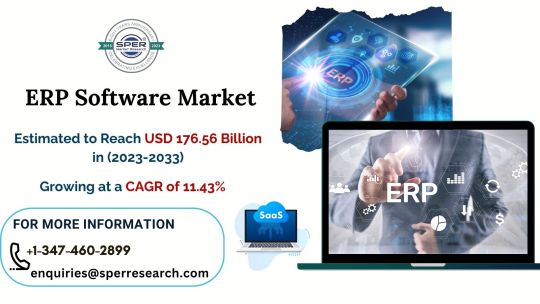
Request For Free Sample Report @ https://www.sperresearch.com/report-store/erp-software-market.aspx?sample=1
The low infrastructure costs and software's ability to interface with mobile devices are expected to grow the market for cloud services. Mobile is an essential component of the workplace culture, and businesses are willing to spend money on cloud-connected mobile applications. It allows individual users to synchronise, update, and control documents. The popularity of cloud and mobile apps is increasing, which is helping the ERP industry grow.
Furthermore, when business applications increase and data is generated across various supply chains, firms can implement a centralised platform that manages all processes. As a result of increasing automation and technological deployments in the supply chain management process, demand for ERP systems has surged, leading to market growth.
CHALLENGES/RESTRAINTS:
High implementation and maintenance costs: Implementing an ERP system may be a considerable financial expenditure for organisations, particularly small and medium-sized firms. Additionally, continuing maintenance and upgrade expenditures might raise the total cost of ownership, making it difficult for some organisations.
ERP implementations frequently include complicated processes that require customisation to meet the specific needs of an organisation. Managing the customisation process can be difficult and may result in delays and increased expenditures.
COVID Impact: The COVID-19 pandemic resulted in widespread lockdowns and the closure of non-essential firms, lowering demand for cloud-based ERPs as corporations focused on cost-cutting and profitability. Furthermore, firms prioritised developing their core skills and cutting costs by eliminating some offices. However, as many nations' lockdown measures are gradually lifted and governments enable enterprises to operate under safety standards, demand for cloud ERPs is projected to rise in the coming months. Furthermore, continued technological breakthroughs and innovations are expected to fuel long-term demand for cloud ERP systems.
North America dominated the ERP software market. This dominance is due to growing use by small and medium-sized businesses, greater investments by ERP suppliers in new technology, and the presence of a large number of market participants. The Asia-Pacific area is primed for growth as a result of a robust manufacturing sector, expanding SMEs, and rising demand for cloud-based solutions, which is being driven by government IT infrastructure investments.
Additionally, some of the market key players are Acumatica, Oracle Corporation, Plex System, QAD Inc., Ramco System, Sage Group, plc, SAP SE, SYSPRO, TOTVS S.A., Workday, Inc., Others.
Global Enterprise Resource Planning Software Market Segmentation:
By Function: Based on the Function, Global ERP Software Market is segmented as; Customer Management, Finance, Human Resource, Inventory Management, Supply Chain Management, Others.
By Size: Based on the Size, Global ERP Software Market is segmented as; Large Enterprises, Medium Enterprises, Small Enterprises.
By Deployment: Based on the Deployment, Global ERP Software Market is segmented as; Cloud, Hybrid, On-Premises.
By End User: Based on the End User, Global ERP Software Market is segmented as; Aero-Space & Defense, Banking, Financial Services, and Insurance (BFSI), Construction, Government & Utilities, Healthcare & Life Sciences, IT & Telecom, Manufacturing, Transportation & Logistics, Others.
By Region: This report also provides the data for key regional segments of Asia Pacific, Europe, Middle East and Africa, North America, Latin America.
This study also encompasses various drivers and restraining factors of this market for the forecast period. Various growth opportunities are also discussed in the report.
For More Information, refer to below link:-
ERP Software Market Size
Related Reports:
Life Science Software Market Size- By Type, By Application, By Component, By Solutions - Regional Outlook, Competitive Strategies and Segment Forecast to 2033
Global 5G IoT Market Size- By Component, By Enterprise Size, By Network Type, By End User- Regional Outlook, Competitive Strategies and Segment Forecast to 2033
Follow Us –
LinkedIn | Instagram | Facebook | Twitter
Contact Us:
Sara Lopes, Business Consultant – U.S.A.
SPER Market Research
+1-347-460-2899
#Enterprise Resource Planning (ERP) Software Market#Enterprise Resource Planning Software Market#ERP Software Market#ERP Software Market Analysis#ERP Software Market Challenges#ERP Software Market Competition#ERP Software Market Demand#ERP Software Market Forecast#ERP Software Market Future outlook#ERP Software Market Growth#ERP Software Market Opportunity#ERP Software Market Overview#ERP Software Market Research Report#ERP Software Market Revenue#ERP Software Market segmentation#ERP Software Market Share#ERP Software Market Size#ERP Software Market Top Industry Players#ERP Software Market Trends#USA ERP Software Market#Canada ERP Software Market#Europe ERP Software Market#Global ERP Software Market
0 notes
Text
Manufacturing ERP: The Top 10 ERP Systems for 2024
Introduction:
In the dynamic landscape of the manufacturing industry, the right technology can make all the difference in streamlining processes and enhancing overall efficiency. Manufacturing Enterprise Resource Planning (ERP) systems have become indispensable tools for businesses seeking to integrate various facets of their operations seamlessly. As we step into 2024, the demand for robust ERP solutions continues to grow. In this blog, we will explore the top 10 Manufacturing ERP systems that are poised to make a significant impact on the industry this year.
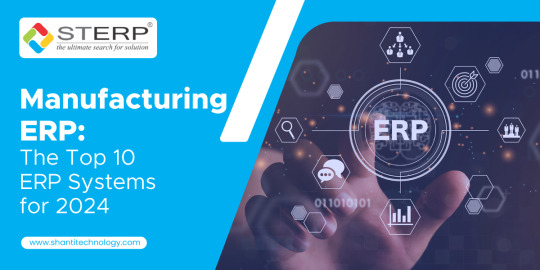
1. SAP S/4HANA: Pioneering Manufacturing Resource Planning System
One of the most trusted names in ERP, SAP S/4HANA stands out as a comprehensive Manufacturing Resource Planning System. Its real-time analytics, integrated modules, and intelligent automation make it an ideal choice for businesses aiming to optimize their manufacturing processes.
2. Oracle ERP Cloud: Empowering Manufacturing Enterprise Resource Planning
Oracle ERP Cloud offers a scalable and flexible solution for manufacturing enterprises. With its robust features, it caters to the diverse needs of businesses, ensuring a seamless integration of manufacturing operations. Its cloud-based architecture provides the agility required for modern manufacturing environments.
3. Microsoft Dynamics 365: A Versatile ERP Solution
Microsoft Dynamics 365 is gaining prominence as a Manufacturing Enterprise Resource Planning software that offers versatility and integration capabilities. Its user-friendly interface and interoperability with other Microsoft products make it an attractive choice for businesses, especially small enterprises.
4. Infor CloudSuite Industrial: Tailored Manufacturing ERP
Infor CloudSuite Industrial is designed with the unique needs of manufacturers in mind. It provides specialized functionalities, including supply chain management and shop floor control, making it a standout choice among ERP solution providers.
5. NetSuite ERP: Unifying Manufacturing Operations
NetSuite ERP is recognized for its ability to unify diverse manufacturing operations into a single, cohesive system. Its cloud-based platform allows for real-time collaboration and data accessibility, making it an efficient Manufacturing Enterprise Resource Planning Software.
6. Epicor ERP: Driving Growth for Small Businesses
Epicor ERP is particularly well-suited for small businesses in the manufacturing sector. With its focus on driving growth and improving efficiency, Epicor ERP offers a cost-effective solution without compromising on essential features.
7. IFS Applications: Comprehensive ERP Solution
IFS Applications is a comprehensive ERP solution that covers a wide range of manufacturing processes. Its modular structure allows businesses to tailor the system according to their specific requirements, making it a preferred choice for Manufacturing Enterprise Resource Planning.
8. IQMS Manufacturing ERP: Enhancing Shop Floor Control
IQMS Manufacturing ERP is distinguished by its emphasis on shop floor control and real-time monitoring. It empowers manufacturers with tools to optimize production processes and make informed decisions, positioning it as a top choice among ERP solution providers.
9. Acumatica Cloud ERP: Scalability for Growing Businesses
Acumatica Cloud ERP stands out for its scalability, making it an ideal choice for growing manufacturing businesses. With a flexible platform and advanced features, Acumatica supports businesses in adapting to changing demands and expanding their operations seamlessly.
10. SYSPRO ERP: Tailored for Manufacturing Success
SYSPRO ERP is tailored to meet the specific needs of manufacturing industries. Its focus on delivering a user-friendly experience and addressing industry challenges positions it as a reliable choice for Manufacturing Enterprise Resource Planning.
Conclusion:
As manufacturing industries evolve, the importance of robust ERP systems cannot be overstated. The top 10 ERP systems highlighted in this blog represent the cutting edge of technology, offering solutions that cater to the unique demands of the manufacturing sector. Whether it's SAP S/4HANA's real-time analytics, Oracle ERP Cloud's scalability, or Acumatica Cloud ERP's flexibility, each system brings its own strengths to the table.
For businesses in Madhya Pradesh seeking Manufacturing Software for Small Business, these ERP solutions provide a pathway to enhanced productivity and streamlined operations. Choosing the right Manufacturing ERP system is a critical decision that can impact a company's growth and competitiveness. Evaluate the features, scalability, and industry focus of each system to find the perfect fit for your manufacturing enterprise. Embrace the power of ERP in 2024 and position your business for success in the ever-evolving landscape of manufacturing technology.
#Manufacturing Software for Small Business#Manufacturing Enterprise Resource Planning Software#ERP Solution Providers in Madhya Pradesh#Manufacturing Enterprise Resource Planning#Manufacturing Resource Planning System#ERP Software#Chain Cycle Management#Business#Engineering#Manufacturing#India#Madhya Pradesh#Go-To-Market#GTM#ERP
7 notes
·
View notes
Text
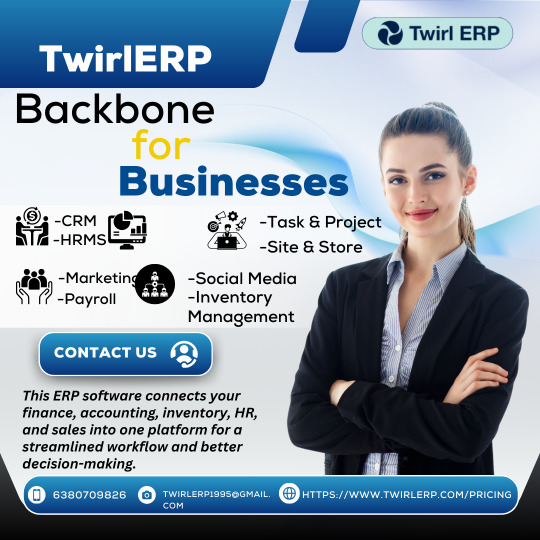
Struggling with data silos and disconnected departments? TwirlERP can be your all-in-one solution!
Twirl ERP software connects your finance, accounting, inventory, HR, and sales into one platform for a streamlined workflow and better decision-making.
4 notes
·
View notes
Text
Erpnext is a Oman VAT erp system in Muscat Oman
#erp software#erp solution#best erp for small business 2024#erp systems#marketing#finance#accounting#crm software
6 notes
·
View notes
Text
Is it Mandatory to Hire ERP Consultant?
Answer is YES
The Crucial Role of ERP Consultants Why You Need Them Before Jumping into ERP
Embarking on an Enterprise Resource Planning (ERP) implementation is a significant step for any organization. It promises streamlined processes, enhanced efficiency, and improved decision-making. However, the journey towards successful ERP adoption is laden with complexities and challenges that can derail even the most well-intentioned initiatives. This is where ERP consultants come into play, serving as invaluable guides and partners in the ERP journey. Here's why you need them before taking the plunge into ERP:
Expertise in ERP Systems ERP consultants are seasoned professionals with extensive knowledge and experience in various ERP systems. They understand the nuances of different platforms, functionalities, and their suitability for diverse business needs. Their expertise helps in selecting the right ERP solution tailored to your organization's requirements, ensuring maximum returns on investment.
Business Process Analysis One of the critical aspects of ERP implementation is aligning the system with existing business processes. ERP consultants conduct comprehensive analyses of your current workflows, identifying inefficiencies, bottlenecks, and areas for improvement. They then map these processes to the functionalities offered by the ERP system, ensuring a seamless integration that optimizes operations.
Customization and Configuration No two organizations are exactly alike, and a one-size-fits-all approach rarely yields optimal results in ERP implementation. ERP consultants assist in customizing and configuring the system to suit your specific business needs. Whether it's tailoring modules, designing workflows, or defining user roles, their expertise ensures that the ERP solution aligns perfectly with your organizational structure and objectives.
Change Management and Training ERP implementation often entails significant changes in workflows, roles, and responsibilities within an organization. Resistance to change can impede the adoption and success of the new system. ERP consultants facilitate change management strategies, helping employees understand the benefits of ERP, addressing concerns, and fostering a culture of acceptance and adaptation. Additionally, they provide comprehensive training programs to equip users with the skills and knowledge needed to leverage the full potential of the ERP system.
Project Management and Risk Mitigation: RP implementation is a complex undertaking involving multiple stakeholders, timelines, and resources. Without proper project management, it's easy for projects to spiral out of control, leading to delays, cost overruns, and subpar outcomes. ERP consultants oversee the implementation process from inception to completion, ensuring adherence to timelines, budgets, and quality standards. They also proactively identify and mitigate risks, minimizing potential disruptions and ensuring a smooth transition to the new system.
Post-Implementation Support The journey doesn't end with ERP go-live. Post-implementation support is crucial for addressing issues, fine-tuning the system, and maximizing its long-term value. ERP consultants provide ongoing support and maintenance services, helping organizations resolve technical glitches, optimize processes, and adapt to evolving business requirements.
In conclusion, ERP implementation is a strategic initiative that demands careful planning, execution, and support. By engaging ERP consultants early in the process, organizations can leverage their expertise to navigate the complexities of ERP adoption successfully. From system selection to post-implementation support, ERP consultants play a pivotal role in ensuring that your ERP journey is smooth, efficient, and ultimately, transformational for your business.
3 notes
·
View notes
Text
14 Marketing Challenges You’ll Face In 2024 (+ Solutions)
In this article, we'll explore 14 marketing challenges that are expected to arise in 2024, along with effective strategies to overcome them.
#artificial intelligence#social media marketing#ai generated#social media#marketing#companies#uk#united arab emirates#uae#dubai#services#abudhabi#erp software uae#erp solutions uae#business setup in uae#attestation services in uae#dubailife
3 notes
·
View notes
Text
The Top Choice: Oracle Enterprise Resource Planning Cloud Service for Your Business Success
Are you searching for the best solution to streamline your business operations? Look no further than the Top Choice: Oracle Enterprise Resource Planning (ERP) Cloud Service. In today's fast-paced business world, organizations need a robust ERP solution to optimize their processes, enhance productivity, and drive growth. Oracle ERP Cloud Service, crowned as the best in the industry, offers a comprehensive suite of tools designed to meet the demands of modern businesses.
Why Choose the Best: Oracle Enterprise Resource Planning Cloud Service?
Oracle ERP Cloud Service stands out as the Best Option for businesses across various industries. Here's why:
Scalability: Easily scale your ERP system as your business grows, always ensuring seamless operations.
Integration: Integrate ERP with other Oracle Cloud services for a unified business platform.
Real-time Insights: Gain valuable insights into your business with real-time analytics, enabling data-driven decision-making.
Security: Rest easy knowing your data is secure with Oracle's advanced security features.
Frequently Asked Questions about the Best Choice: Oracle ERP Cloud Service
Q1: What modules are included in Oracle ERP Cloud Service?
A1: Oracle ERP Cloud Service includes modules for financial management, procurement, project management, supply chain management, and more. Each module is designed to optimize specific aspects of your business.
Q2: Is Oracle ERP Cloud Service suitable for small businesses?
A2: Yes, Oracle ERP Cloud Service is scalable and can be tailored to meet the needs of small, medium, and large businesses. It offers flexible solutions suitable for businesses of all sizes.
Q3: How does Oracle ERP Cloud Service enhance collaboration among teams?
A3: Oracle ERP Cloud Service provides collaborative tools that enable teams to work together seamlessly. Features like shared calendars, document management, and task tracking enhance communication and collaboration.
Conclusion: Empower Your Business with the Best ERP Solution
Oracle Enterprise Resource Planning Cloud Service is not just a choice; it's the Ultimate Solution for businesses seeking to optimize their operations. By harnessing the power of Oracle ERP, you can streamline processes, improve efficiency, and drive innovation. Don't let outdated systems hold your business back. Embrace the future with Oracle ERP Cloud Service and propel your business to new heights.
Ready to transform your business? Contact us today to explore the endless possibilities with the best ERP solution on the market.
#oracle#oracle erp#rapidflow#oracle erp cloud service#best erp solution#oracle erp service providers#business#business automation#oracle services#enterprise software#scalability#integration#rpa#market#erp
3 notes
·
View notes
Text
Retail Digital Transformation Industry Opportunities and Growth Analysis, 2025-2030 - Global Market to Grow by Over $550 Billion During the Forecast Period.
#digitaltransformation#technology#innovation#business#digitalmarketing#ai#digital#artificialintelligence#software#machinelearning#automation#businessgrowth#tech#iot#techinnovation#bigdata#cybersecurity#cloud#data#cloudcomputing#smallbusiness#customerexperience#marketing#sap#webdevelopment#erp#blockchain#analytics#ecommerce#datascience
0 notes
Text
youtube
Empower your Real Estate Business with Our Cloud Telephony IVR Solution. It helps you manage all your business lead capture/ assignment, Auto dialer, smart automated followups, detailed employee tracking, and call recording in a single dashboard.
#crm#marketing#business#dynamics#management#technology#ecommerce#software#dashboard#erp#adminpanel#digitalmarketing#Youtube
0 notes
Text
How Manufacturers Can Manage Growth with ERP
Introduction:
In the dynamic landscape of manufacturing, where growth is the ultimate goal, the ability to adapt and streamline operations is paramount. Enter ERP (Enterprise Resource Planning), a powerful solution that has revolutionized the way manufacturers operate. In this blog, we'll explore the significant role of ERP software for manufacturing industry and how it serves as a catalyst for sustainable growth. Whether you're in traditional manufacturing or a software development company, ERP solutions are key to optimizing processes and managing growth effectively.
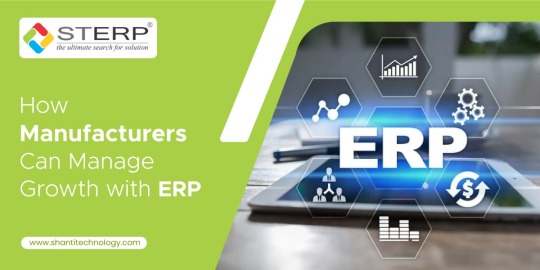
Understanding the Essence of ERP Software for Manufacturing:
1. Efficiency Unleashed:
ERP system for manufacturing industry is designed to enhance operational efficiency by integrating various business processes. From order management and procurement to production planning and inventory control, ERP systems bring together disparate functions into a unified platform, eliminating silos and enhancing overall efficiency.
2. Real-time Insights:
One of the key advantages of ERP solutions is the ability to provide real-time insights into business operations. Manufacturers can make informed decisions based on up-to-date information, helping them respond swiftly to market changes, manage resources effectively, and capitalize on growth opportunities.
3. Scalability Matters:
As a manufacturer, scalability is a constant consideration. Whether you're a growing traditional manufacturing unit or a software development company expanding its operations, ERP systems offer scalability to accommodate changing needs. The modular nature of ERP solutions allows businesses to add or modify functionalities as they evolve.
4. Improved Collaboration:
Collaboration is the bedrock of successful manufacturing. ERP fosters better communication and collaboration by providing a centralized platform where employees across different departments can access and share information seamlessly. This not only enhances teamwork but also accelerates decision-making processes.
ERP Software for Manufacturing Industry: Tailoring Solutions for Success
1. Production Planning and Scheduling:
In the manufacturing realm, effective production planning and scheduling are crucial for meeting customer demands and maintaining optimal inventory levels. ERP systems facilitate streamlined production processes, enabling manufacturers to create realistic production schedules, allocate resources efficiently, and minimize downtime.
2. Supply Chain Management:
A well-integrated supply chain is essential for manufacturers. ERP solution for the manufacturing industry ensures smooth coordination between suppliers, manufacturers, and distributors. This results in better inventory management, reduced lead times, and ultimately, improved customer satisfaction.
3. Quality Control:
Maintaining consistent product quality is non-negotiable in manufacturing. ERP solutions provide tools for comprehensive quality control by enabling real-time monitoring of production processes, tracking defects, and ensuring adherence to quality standards. This not only boosts customer confidence but also reduces wastage and rework costs.
4. Financial Management:
The financial aspect is the backbone of any business. ERP systems for manufacturing offer robust financial management capabilities, including invoicing, expense tracking, and financial reporting. This level of financial control is invaluable for manufacturers looking to manage growth effectively and make strategic financial decisions.
ERP for Software Development Company: Tailoring Solutions to Tech
1. Project Management:
For software development companies, managing projects efficiently is critical. ERP solutions designed for the software development industry offer project management modules that help track project timelines, allocate resources effectively, and ensure that development projects stay on course.
2. Resource Planning:
In the software development realm, talent is a primary resource. ERP systems tailored for software companies facilitate resource planning by providing insights into employee availability, skills, and project commitments. This ensures optimal resource allocation for project success.
3. Version Control and Collaboration:
Version control and collaboration are key aspects of software development. ERP solutions for software companies include features that enable version control, code collaboration, and documentation management. This ensures that development teams work cohesively, leading to efficient project outcomes.
4. Compliance and Security:
In the software development industry, compliance and security are paramount. ERP systems for software companies often include modules that help manage compliance with industry standards and ensure data security. This is especially crucial in an era where data protection is a top priority.
Conclusion:
As manufacturers navigate the complexities of growth, ERP software emerges as an indispensable tool for success. Whether you're in traditional manufacturing or a software development company, the benefits of ERP systems are far-reaching. From enhancing operational efficiency and providing real-time insights to tailoring solutions for specific industry needs, ERP is the key to managing growth effectively. Embrace the power of ERP, and propel your manufacturing operations into a future of streamlined processes, informed decision-making, and sustained success.
#Go-To-Market#GTM#Supply-Chain-Management#Technology#India#ERP-India#ERP#Business-Solutions#Manufacturer#Engineering#Inventory-Management#ERP Software for Manufacturing Industry#ERP System for Manufacturing Industry#ERP for Software Development Company#ERP Solutions for Manufacturing
7 notes
·
View notes
Text
What is Search Engine Optimization (SEO)?
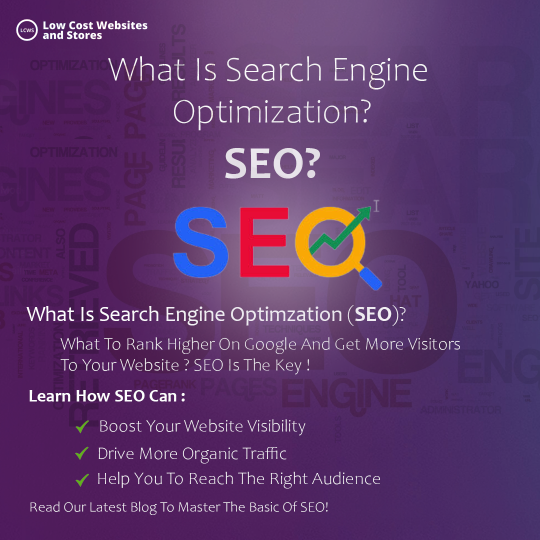
Want to rank higher on Google and drive more traffic to your website? Discover the power of Search Engine Optimization (SEO)! This guide breaks down what SEO is, why it matters, and how you can use it to boost visibility, attract more visitors, and grow your business. Click Here to learn the essentials and start ranking higher today!"
#erp#erp software#erp solution bd#erp system#erpsoftware#odoo development#odoo#odoo development company#odoo development services#odoo erp#seo services#seo#digital marketing#social media marketing#google ads#search engine optimization#crm software#services#software development#online marketing#online business#online store#ecommerce#socialmedia#business#startup#entrepreneur#branding#google#search engine marketing
0 notes
Text
0 notes
Text
Leading Roulette Game Development Company in Noida – Thixpro Technologies
The world of online gaming has grown exponentially over the past few years, and the gambling industry, especially online roulette, has witnessed a surge in demand. As one of the most iconic casino games, roulette offers excitement, anticipation, and the chance to win big. At Thixpro Technologies, we are proud to be a leading roulette game development company in Noida, specializing in crafting…

View On WordPress
#API Integration development Company In Noida#Best Digital Marketing Company In Noida at affordable price#Chess Game Development Company in Noida#CRM Software Development Company in Noida#ERP Software Development Company in noida#Game Development Company in Noida#Leading Roulette Game Development Company in Noida#Mobile Game App Development Company in Noida#Payment Gateway Integration company In Noida#Top E-commerce Website Development Company in Noida#Top Website Development Company in Noida
0 notes
Text
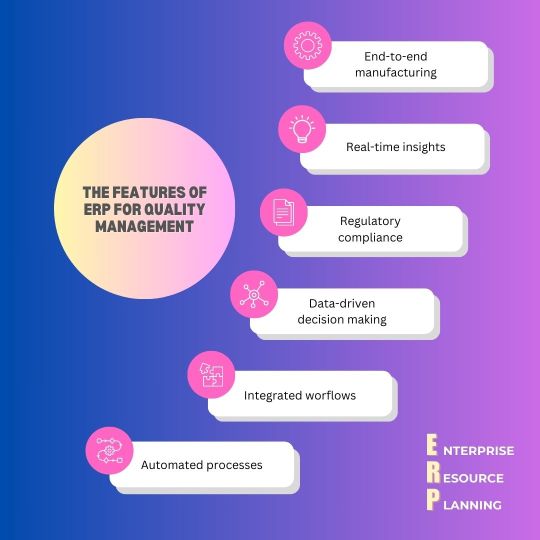
Implementing an ERP for quality control can transform how businesses manage and maintain high standards. With features like end-to-end manufacturing processes, real-time insights, and regulatory compliance, an ERP for quality management ensures smooth and efficient operations.
Key functionalities such as data-driven decision-making, integrated workflows, and automated processes make it easier to monitor and improve product quality. A robust quality control ERP helps manufacturers streamline processes, enhance productivity, and maintain compliance with industry regulations.
Explore more about how an ERP in quality control can support your business and improve operational efficiency here.
#erp#erp software#erp system#techsolutions#erp implementation#erp services#erp solutions provider#innovation#technology#erp systems#industry solutions#tech solutions#erp softwares#marketing#quality#quality control#quality management
0 notes